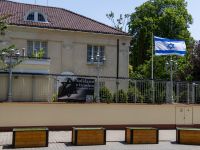Since the first moment of the 55th Cannes International Film Festival and even before Elia Suleiman’s Divine Intervention as the first Palestinian film to participate in the festival’s official contest, the Palestinian Israeli conflict paved its way to the festival as expected.
The film Kedma by the Israeli director Amos Ghitai was screened in the official contest. In his third film to show at Cannes in four years, Gitai looks back a half-century to the birth of his country. With Kedma, Gitai turns to the days just before the creation of Israel in May 1948.
Kedma is only one of several films chosen at Cannes this year to address the Israeli-Palestinian struggle. Also in the main competition is Intervention Divine, by Palestinian director Elia Suleiman, while another Palestinian film, Rana's Wedding, was screened as part of a separate competition.
Rana’s Wedding, produced in collaboration with Holland, shot in Jerusalem under the direction of Hani Abu Asa’d and based on a story written by Liana Bader, flared a storm of solidarity.
Rana’s Wedding is a film full of feelings and tackles the general problem which Palestinian filmmakers have been addressing in different ways since the film Gallili Wedding by Michael Khalifi was screened.
Has the Palestinian the right to live as an individual? Has he the right to lead a normal life away from the long running image which has been established over 50 years until the satellite channels came amid rapid events to consolidate it as the image of the human/issue.
This does not mean that the director distances his characters away from the ongoing events and their history made by these events. The fact is that the director knew how to make a balance between the Palestinian as a human being and an ordinary Palestinian.
The film’s hero is a woman because the director wanted this important but not new experience to focus on a female who lives her childhood and future dreams without distancing herself from others. The viewers track Rana’s (Played by Clara Khouri) smile, sadness, longing and fear particularly during her tour in Jerusalem early and her round trip from Jerusalem and Ramallah until her wedding party.
The character is not neutral as we see the entire Palestinian real situation through her. On the eve of the Intifada Rana appears to watch, challenge, fear and love. She examines the circumstances of the city; looses her bag and becomes concerned about the Israeli destruction of her neighbor house. She stands steadfast in the place.
Rana leads her love Khalil whom she becomes weak in front of for little moment but she restores her control.
The viewer feels the full incorporation between him and the city that wants to live. She knows that everything is against her life including the horrible and horrified Israeli ghosts -- Albawaba.com
© 2002 Al Bawaba (www.albawaba.com)







